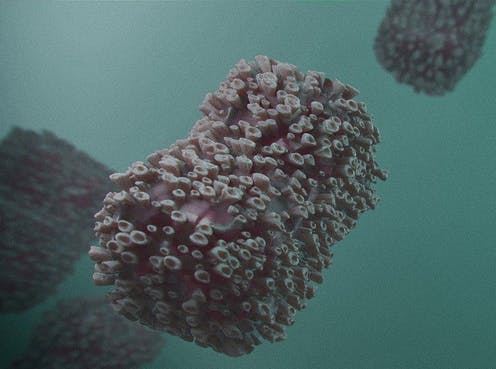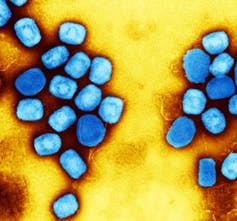
As we pass the one-month milestone of the current monkeypox outbreak, reports are emerging that the World Health Organization (WHO) intends to change the name of the monkeypox virus to avoid stigma and discrimination. While this is an important step, more than a name change may be needed.
As a researcher studying metaphors in health, I use critical metaphor analysis to explore how the metaphors used to understand and discuss monkeypox may amplify problematic, discriminatory and dangerous social beliefs.
When an issue is metaphorically framed a certain way, the solution to that issue often follows within the same frame. For example, metaphors used in the context of COVID-19 frequently framed it as an enemy, and the pandemic as a war. Within this frame, actions of “making sacrifices,” “celebrating heroes on the front lines,” and “sheltering in place” made sense.
In the first month since monkeypox cases have been identified, different frames have been used to understand it. Each has possible consequences.
Table of Contents
A metaphorical criminal or child
One way monkeypox is metaphorically framed is as a criminal. This criminal is constructed as having broken out of the West African area in which it had previously been contained. It has been “introduced” to the “community,” moving “undetected,” creating a “threat” and “increasing risk.” Monkeypox may even be masked or disguised.

(NIAID), CC BY
When monkeypox is characterized as a criminal, the reasonable social response is to treat it as such. This is seen in how we describe the response to monkeypox in criminal terms: “suspected cases” need to be “investigated” and “detected” to “contain” it. We create a story that makes sense given the type of stories we are familiar with, and the words we have available. This can spill over into how we respond to people with the virus.
Monkeypox has also been described as being “related to,” the “cousin” of, or “in the same family” as smallpox. In comparison to smallpox, which previously received significantly “more attention and resources,” monkeypox was comparatively “neglected.”
Only now is monkeypox “attracting attention,” “making itself known” in “unexpected places” and ceasing to be “mute.” It is “popping up on our doorstep” and inviting itself into our communities. These descriptions combine into a characterization of monkeypox as something of a neglected, rebelling child.
How metaphors feed narratives
The metaphors framing monkeypox occur in the broader context of existing discriminatory narratives. Characterizing monkeypox as a criminal may have problematic consequences when it occurs alongside reports of cases among men who have sex with men.
Ongoing LGBTQ+ history is riddled with criminalization, where identifying as LGBTQ+ is considered a crime, as well as a history of being considered an “illness.” Inaccurate descriptions of HIV/AIDS as a disease affecting only gay men further entrenched these harmful, stigmatizing narratives.
When monkeypox is framed as a criminal in the context of this history, it may strengthen the association between LGBTQ+ identity, illness and criminality.
Similarly, when monkeypox is portrayed as a “Black” disease, through the frequent imagery of lesions on Black bodies and association with Africa, alongside the ongoing criminalization of Black people, this may further entrench that narrative.
À lire aussi :
Strip searches are ineffective, unnecessary and target racialized Canadians
The story of the neglected, rebelling child runs parallel to a larger colonial narrative that infantilizes many African countries and peoples. Metaphorically, countries are constructed as people: political “bodies” that interact within, and are part of, a larger “international community.”
In these metaphors, western countries are often framed as parents, and those still “developing” as child-like. Western countries could be perceived to have a responsibility to help them develop “correctly” if they are rebelling, which fuels colonialist attitudes, policies and actions.

(NIAID), CC BY
Monkeypox characterized as a neglected, rebelling child may blend with broader colonial and racist narratives, fuelling racist beliefs and actions. Another racist narrative compares Black people to apes and other primates. This narrative is evoked in conjunction with the child metaphor through the virus’s name — monkeypox — along with descriptions of it originating from particular African regions or countries.
The case for name change
One of the reported reasons for the WHO’s intended name change is to disassociate monkeypox with the African continent,, particularly the names of variants with African countries. There is also a call to stop using images of lesions on Black bodies when discussing the virus.
In the context of broader discriminatory narratives discussed here, this makes sense. Breaking these associations may weaken the link between the language used to understand monkeypox and the broader discriminatory narratives that permeate culture.
However, the metaphors used to understand the virus will still exist. They may still be problematic. As we decide “who monkeypox is,” we need to consider not only if this is an accurate characterization of the virus, but how this narrative may intermingle with others already in circulation and the harmful consequences this may have on sustaining racist, colonial, homophobic and other discriminatory attitudes and beliefs.
![]()
Kaitlin Sibbald receives funding from the Social Sciences and Humanities Research Council. She is affiliated with the Canadian Association of Occupational Therapists.






















